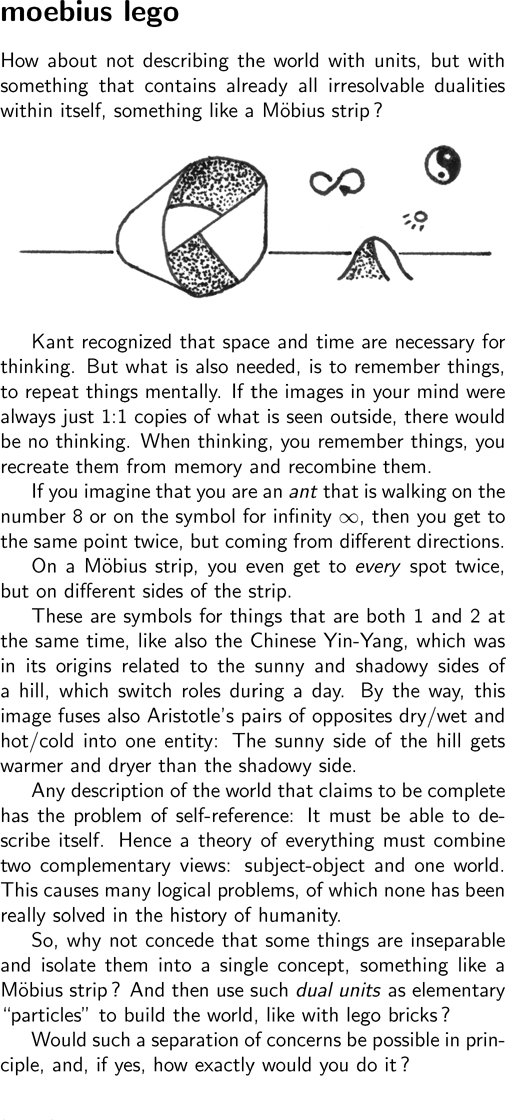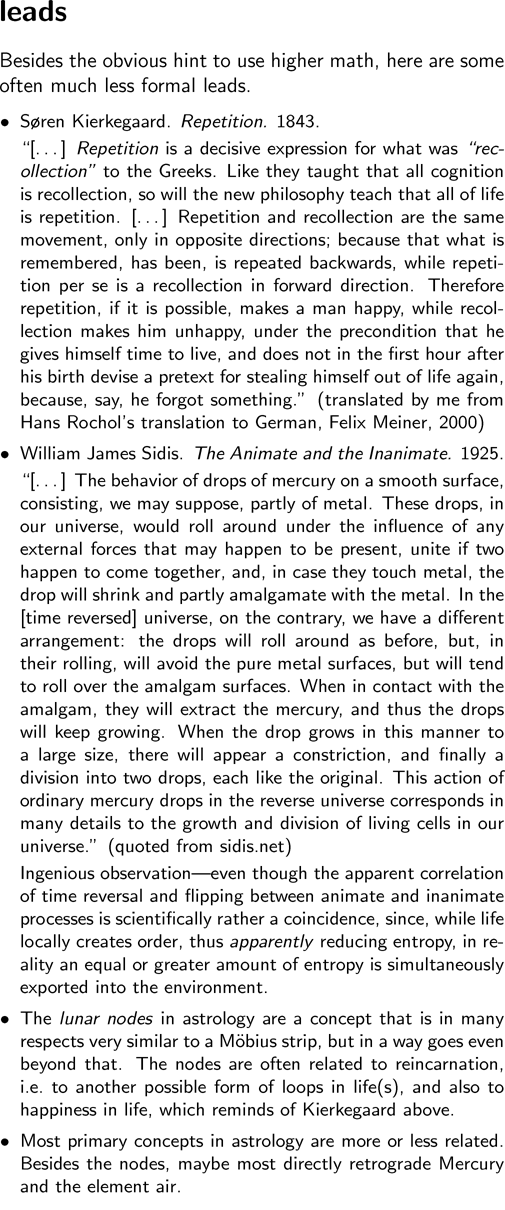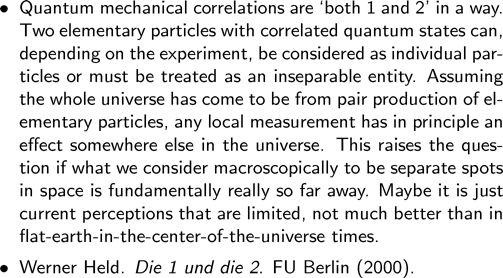|
|
moebius lego
How about not describing the world with units, but with
something that contains already all irresolvable dualities
within itself, something like a Möbius strip ?
[image]
Kant recognized that space and time are necessary for thinking.
But what is also needed, is to remember things, to repeat things
mentally. If the images in your mind were always just 1:1 copies
of what is seen outside, there would be no thinking. When
thinking, you remember things, you recreate them from memory
and recombine them.
If you imagine that you are an ant that is walking on
the number 8 or on the symbol for infinity ∞, then you
get to the same point twice, but coming from different directions.
On a Möbius strip, you even get to every spot twice,
but on different sides of the strip.
These are symbols for things that are both 1 and 2 at the same
time, like also the Chinese Yin-Yang, which was in its origins
related to the sunny and shadowy sides of a hill, which switch
roles during a day. By the way, this image fuses also Aristotle's
pairs of opposites dry/wet and hot/cold into one entity:
The sunny side of the hill gets warmer and dryer than the
shadowy side.
Any description of the world that claims to be complete has the
problem of self-reference: It must be able to describe itself.
Hence a theory of everything must combine two complementary
views: subject-object and one world. This causes many logical
problems, of which none has been really solved in the history
of humanity.
So, why not concede that some things are inseparable and isolate
them into a single concept, something like a Möbius strip ?
And then use such dual units as elementary "particles"
to build the world, like with lego bricks ?
Would such a separation of concerns be possible in principle,
and, if yes, how exactly would you do it ?
leads
Besides the obvious hint to use higher math, here are
some often much less formal leads.
Søren Kierkegaard. Repetition. 1843.
"[...] Repetition is a decisive expression for what
was "recollection" to the Greeks. Like they taught that
all cognition is recollection, so will the new philosophy teach
that all of life is repetition. [...] Repetition and recollection
are the same movement, only in opposite directions; because that
what is remembered, has been, is repeated backwards, while
repetition per se is a recollection in forward direction. Therefore
repetition, if it is possible, makes a man happy, while recollection
makes him unhappy, under the precondition that he gives himself time
to live, and does not in the first hour after his birth devise a
pretext for stealing himself out of life again, because, say, he
forgot something." (translated by me from Hans Rochol's translation
to German, Felix Meiner, 2000)
William James Sidis. The Animate and the
Inanimate. 1925.
"[...] The behavior of drops of mercury on a smooth surface,
consisting, we may suppose, partly of metal. These drops, in our
universe, would roll around under the influence of any external
forces that may happen to be present, unite if two happen to come
together, and, in case they touch metal, the drop will shrink and
partly amalgamate with the metal. In the [time reversed] universe,
on the contrary, we have a different arrangement: the drops will
roll around as before, but, in their rolling, will avoid the pure
metal surfaces, but will tend to roll over the amalgam surfaces.
When in contact with the amalgam, they will extract the mercury,
and thus the drops will keep growing. When the drop grows in this
manner to a large size, there will appear a constriction, and
finally a division into two drops, each like the original. This
action of ordinary mercury drops in the reverse universe
corresponds in many details to the growth and division of living
cells in our universe." (quoted from sidis.net)
Ingenious observation - even though the apparent correlation of
time reversal and flipping between animate and inanimate processes
is scientifically rather a coincidence, since, while life locally
creates order, thus apparently reducing entropy, in
reality an equal or greater amount of entropy is simultaneously
exported into the environment.
- The lunar nodes in astrology are a concept that is
in many respects very similar to a Möbius strip, but in a way goes
even beyond that. The nodes are often related to reincarnation,
i.e. to another possible form of loops in life(s), and also to
happiness in life, which reminds of Kierkegaard above.
- Most primary concepts in astrology are more or less related.
Besides the nodes, maybe most directly retrograde Mercury
and the element air.
- Quantum mechanical correlations are 'both 1 and 2' in a way.
Two elementary particles with correlated quantum states can,
depending on the experiment, be considered as individual particles
or must be treated as an inseparable entity. Assuming the whole
universe has come to be from pair production of elementary particles,
any local measurement has in principle an effect somewhere else in
the universe. This raises the question if what we consider
macroscopically to be separate spots in space is fundamentally really
so far away. Maybe it is just current perceptions that are limited,
not much better than in flat-earth-in-the-center-of-the-universe times.
- Werner Held. Die 1 und die 2. FU Berlin (2000).
|
















